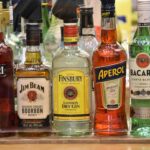“Every form of addiction is bad, no matter whether the narcotic be alcohol or morphine or idealism.” —Carl Jung
Many of us are familiar with the fact that alcohol, in the stomach of those with a family history of alcoholism, is already pre-destined to drink and experience potentially negative consequences. If we continue drinking alcoholically with impunity, there is a strong likelihood your grandparents, parents or even aunts and uncles have contributed to this incurable disease. Regardless of where you are in your family of origin, changes are significant to your falling victim to the affects alcohol use disorder (AUD).
For someone diagnosed with AUD or SUD (Substance Use Disorder) alcohol is cunning, baffling and powerful.It is the only disease that tells us we don’t HAVE a disease as we’re looking up from the gutter. AUD could be characterized as a disease of denial. Many drinkers take this denial to their grave in the name of heart failure, lung, or liver disease even as we know the gravity of alcohol itself, played a significant role in the death of their loved one.
Scientists and researchers are digging their sights deep into the correlation genetics play and the psychological and long-term effects and implications of alcohol. The American Journal of Psychiatry (September 2021) Death and Despair outcomes (deaths from suicide, AUD and liver diseases) have increased since the Pandemic. Statistically alcohol is at the heart of 15% of overdoses; 26% of all suicides and 50% of liver diseases.
Here are seven misunderstood myths about alcohol. If you have echoed this before, it could be a sign that you’re headed to the end of the line of “normal drinking.” You’ve possibly moved into the position of no return”‘”‘that of a chronic drinker.
I only Drink on weekends
The medical community agrees that alcohol, in any form, is a progressive disease. We put it in remission when we stop drinking. Drinking any amount is how we keep the disease active as it destroys brain cells, our liver, and other organs. At some point or another, our drinking and the thinking that goes along with our weekend drinking becomes obsessive, controlling and we drink more, to make up for what we lost during the week.
I don’t hurt anyone when I drink: (because I drink at home)
When we pick up a drink, we become in a trancelike state fueled by a short-lived feeling of euphoria and an obsession that says, “More will get us there again.” We begin to “change” psychologically in order to control our drinking. Questions of how much will last for the weekend, and a sense of doom that no matter the amount, it probably won’t be enough, begin to infiltrate our thinking. We become either self-centered, resentful and refuse to engage in much of anything that will take us away from our drink. Others may selfishly isolate, preferring to hide our drinking from everyone by staying alone. The variations of how we act and what we do to preserve our drinking soon include guilt and shame, for we know we must act alone.
So while we may not have had a dui (yet,) or gotten in a car accident (yet,) stole money, missed work, told lies and worse–all in the name of alcohol, eventually, any, of these will be ours for the waiting. It comes with the natural progression of our disease.
I can stop whenever I want to!
If you think you can, try getting up from the bar or your living room after that one beer or one cocktail. It may work for a good while, but sooner or later, every drinker crosses an imaginary line of no return. We can’t see it, because the degradation of brain cells, synapses and organ functions is happening on the inside. We get older, the pandemic has provided more hardships in a myriad of ways, and all of this makes for wear and tear on our internal selves. Hormones and our cellular makeup is forever changing. What does all of that have to do with us today?
 We don’t know if it’s the first drink, or the 100th that is the one getting us drunk or bringing consequences, because the 100th is not enough, and one is too many!
We don’t know if it’s the first drink, or the 100th that is the one getting us drunk or bringing consequences, because the 100th is not enough, and one is too many!
The danger becomes while drinking: once we cross that imaginary line of no return, there is no going back to being a normal drinker. We like to use the analogy of, “you can’t change a pickle back to a cucumber!” And so it is with someone with AUD.
I have a great job, a loving family, and am liked and adored by many.
Alcohol is a drink of denial. If we react to the phenomenon of craving where we become emotionally and psychologically obsessive in our need for more, if we can ‘feel’ a shift or transformation in our personality, regardless of how exhibited, then chances are good we are susceptible to, or may have AUD.
I’ve never had a DUI, I’ve never been to Jail; I don’t drink under a bridge with a paper bag
One doesn’t have to have had a DUI, been locked up in a psych ward or jail to have AUD. These are the unmistakable consequences of what happens to many whose drinking becomes out of control and the consequences become more demonstrable from here.
I don’t drink under a bridge with a paper bag
Rarely would we see anyone under a bridge drinking from a paper bag. That may have been the case during your grandparents’ time but not today.
I have no alcoholism in my family
“I am smarter than most, have 3 Ph.d’s and my doctorate in medical implications of the undernourished has enabled me to be selected for a Nobel Peace Prize.”
“I’m responsible in every way. I can’t have alcoholism because I’m too smart and independent in my interactions… except for when I drink.”
Unfortunately, there is no significance to this and drinking since alcohol use disorder, or alcohol abuse knows not the difference from scholars to paupers. There is no one that is immune against the effects of alcoholism if you drink.
I only have two drinks per night, never more.
By this time, some of us laugh when we hear this. Those who are in recovery or who have AUD, understand that what we’re really saying is something that resembles, “I have two bottles of wine at night, or more like three to four drinks per night, never more.”
In conclusion, we drink to escape, because we like the effect.
Some of us found no pleasure when drinking, other than the indisputable effect it had over us.
It is not the number of drinks one has that is the problem; it is the departure from reality that, for us, was the equivalent to being insane.
We needed an escape route and alcohol was the answer. Here, we could forget about the pressures of life and, for a brief time imagined we had comfort and jurisdiction over everyone and everything. Eventually, however, the ruse runs dry and stops working.
Everything is a matter of time. The greatest danger is whether we crossed over that imaginary line of no return. There is no greater day like today to stop. We put down the gun used to play Russian roulette and just stop. Because to drink alcohol is akin to taking our chance with this dangerous game of Russian roulette.
Will we explode with the first drink or the tenth? There remains no observable nor logical way to predict which drink it will be that we were behind a hit and run, cause a blackout, or wake up in jail. Alcohol presents differently for every person for reasons varied and unpredictable. The stigma associated with drugs and alcohol, the historical unpredictability and resultant consequences of our actions is no different today than it was 75 years ago, with the inception of AA.
Denial that we have or may have AUD makes many of us work harder to dispel the illusion that we can drink like normal people. Left to our own solutions, we just don’t get off the squirrel-cage of insanity from doing the same thing and expecting results. We prefer the devil we think we know and so long as alcohol “protects” us from the fear of the unknown, we tell ourselves, “we’re good.”
Unfortunately, because of the stigma and fear surrounding treatment and recovery overall, the funding needed to affect startling and drug-free solutions isn’t there yet. Like those who have passed from smoking, those who die from AUD carry with them the message, ‘this could have been avoided.” These diseases, together with a lack of funding for substance abuse and mental health tell me it will be many more years before society embraces the fact that we are all susceptable to some form of mental health or substance abuse.
Harriet Hunter has lived in the trenches of the devil and effects of both mental health and substance abuse for thirty-years. It is this experience and the affirmation of many that qualifies me for writing on these topics. She is an expert in long-term sobriety and life on lifes’ terms one day at a time. With awareness, it is hoped that maybe someone who needs this will seek out recovery and be the difference for them and the family and people whose lives they touch.
If you like what you’ve read, please share and let me know. It is through your affirmation that I keep writing and providing hope to others through information and insight into the truth about alcohol use disorder
If you want more of what you’ve heard here, visit me at https://Harriethunter.org/deepdivevideos and receive your free gifts that are waiting on you!

